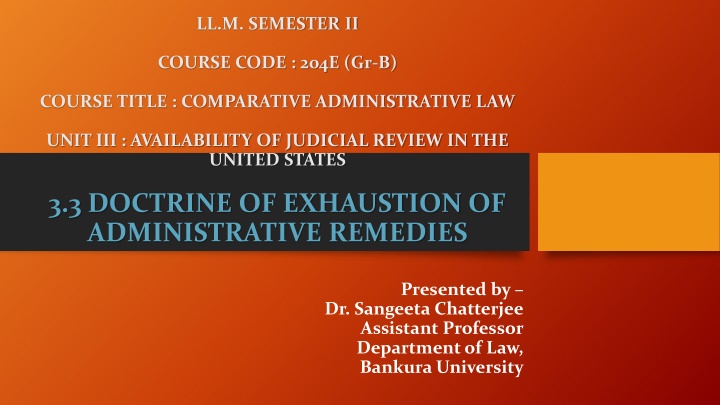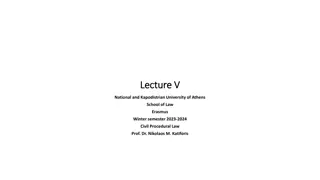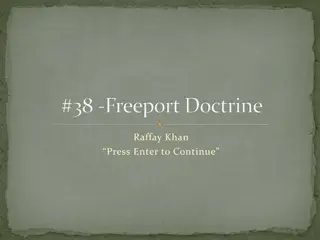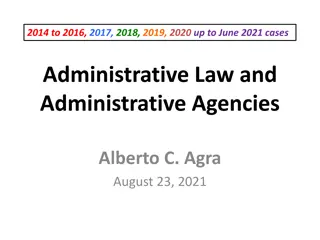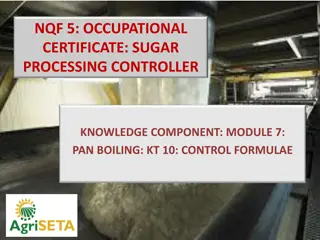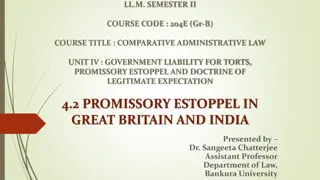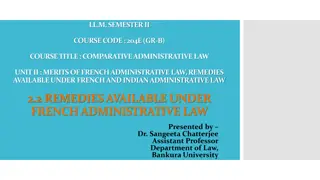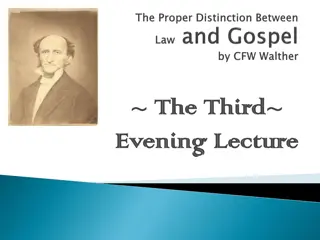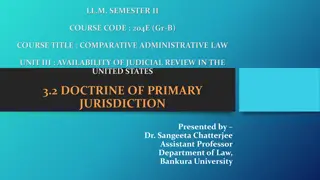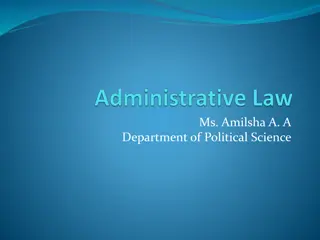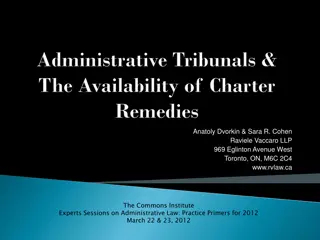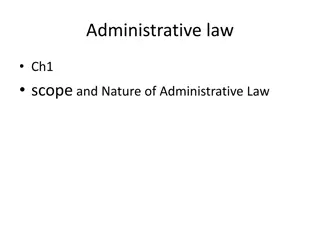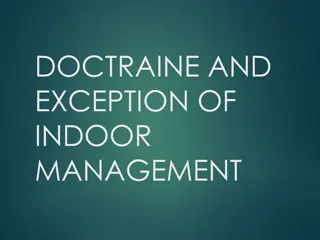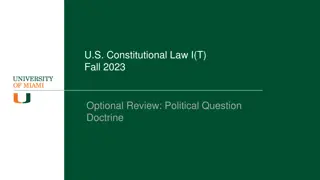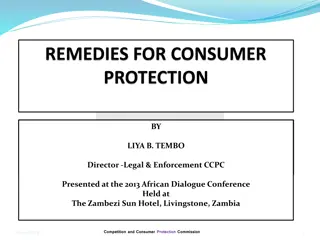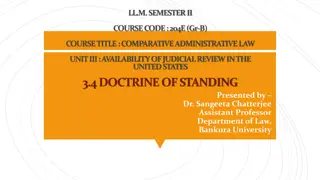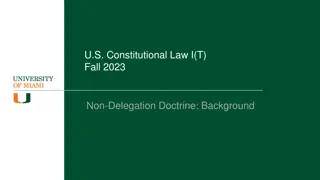Doctrine of Exhaustion of Administrative Remedies in Comparative Administrative Law
The doctrine of exhaustion of administrative remedies requires litigants to pursue all available remedies with administrative authorities before seeking judicial review. Originating from the case of Myers v. Bethlehem Shipbuilding Corp, this doctrine aims to respect congressional intent and promote effective judicial administration. Developing further through subsequent case laws, exhaustion is seen as a policy-driven requirement rather than solely being based on legislative intent.
Download Presentation

Please find below an Image/Link to download the presentation.
The content on the website is provided AS IS for your information and personal use only. It may not be sold, licensed, or shared on other websites without obtaining consent from the author.If you encounter any issues during the download, it is possible that the publisher has removed the file from their server.
You are allowed to download the files provided on this website for personal or commercial use, subject to the condition that they are used lawfully. All files are the property of their respective owners.
The content on the website is provided AS IS for your information and personal use only. It may not be sold, licensed, or shared on other websites without obtaining consent from the author.
E N D
Presentation Transcript
LL.M. SEMESTER II COURSE CODE : 204E (Gr-B) COURSE TITLE : COMPARATIVE ADMINISTRATIVE LAW UNIT III : AVAILABILITY OF JUDICIAL REVIEW IN THE UNITED STATES 3.3 DOCTRINE OF EXHAUSTION OF ADMINISTRATIVE REMEDIES Presented by Dr. Sangeeta Chatterjee Assistant Professor Department of Law, Bankura University
INTRODUCTION Exhaustion of administrative remedies before going to court is sometimes required and sometimes not. This statement is an accurate but disturbing description of the state of the law on an important administrative law doctrine. The issue of exhaustion of administrative remedies arises when a litigant, aggrieved by an agency's action, seeks judicial review of that action without pursuing available remedies before the agency itself. The court must decide whether to review the agency's action or to remit the case to the agency, permitting judicial review only when all available administrative proceedings fail to produce a satisfactory resolution.
DOCTRINE OF EXHAUSTION OF ADMINISTRATIVE REMEDIES The doctrine of exhaustion of administrative remedies means that, before going to judicial review of an administrative action, all other available remedies under the administrative authorities should be exhausted. Therefore, the litigant, aggrieved by an agency's action, should give every chance to the said agency to provide every possible remedy by itself. The litigant cannot seek judicial review of that action without pursuing available remedies before the agency itself. The court must permit judicial review only when all available administrative proceedings fail to produce a satisfactory resolution.
ORIGIN OF THE DOCTRINE The leading federal decision on exhaustion of administrative remedies is Myers v. Bethlehem Shipbuilding Corp, 303 U.S. 41 (1938). In Myers, the Supreme Court held that a court may not enjoin administrative proceedings on a complaint even if the plaintiff before the court claims that the agency lacks jurisdiction to act. The Court based its decision on what is called the long settled rule of judicial administration that no one is entitled to judicial relief for a supposed or threatened injury until the prescribed administrative remedy has been exhausted.
DEVELOPMENT OF THE DOCTRINE The Court provided little exposition of the rationale behind the rule. It indicated that an injunction would interfere with Congress's determination that certain issues should be decided exclusively by the agency in the first instance, but it did not discuss what interests in "judicial administration" wereat stake. On this level, requiring exhaustion is no more than complying with congressional intent. Later case laws developed the exhaustion doctrine further, basing it on reasons of policy more than on expressed legislative intent.
DISTINCTION BETWEEN PRIMARY JURISDICTION AND EXHAUSTION The doctrine of primary jurisdiction typically arises when a party asks a court to decide an issue that does not involve judicial review of an administrativeaction. Primary jurisdiction comes into play if that claim could also be heard initially by an administrativeagency. The court must decide whether to give the agency primary jurisdiction over the claim, thereby declining to hear the claim until it is decided by the administrative body. In the typical exhaustion case the agency has already taken some action and the court must decide whether to review the agency's action or require the plaintiff first to invoke furtheradministrative proceedings.
REASONS FOR APPLICATION OF THE DOCTRINE Administrative Autonomy Separation of Powers Judicial Economy Administrative Efficiency Agency's Opportunity to Correct Its Own Errors Attaining Accurate Determination of Facts Promoting Democratic Values Preserving a Limited Scopeof Judicial Review Protecting Representation of Diverse Interests
PROBLEMS OF THE DOCTRINE The law on exhaustion is so uncertain that, parties deciding whether to pursue an administrative remedy or go to court cannot accurately predictwhethera court would requireexhaustion. Some parties who would be entitled to a judicial resolution will not seek judicial relief. If a court and an agency would not reach the same result, like cases will be treated differently. The uncertainty in the law on exhaustion increases a party's cost of determining whether to exhaust an administrative remedy or to seek immediate judicial review.
PROBLEMS OF THE DOCTRINE If the law on exhaustion is clear, that decision is easy. If the law is uncertain, the decision is moredifficult. Even if application of a vague law results in a just decision in a given case, the holding provides little guidance and imposes decisional costs on parties with subsequent conflicts. Finally, the uncertainty of the exhaustion exceptions increases litigation overwhetherexhaustion is necessary. Litigating exhaustion issues has adverse effects, even if exhaustion is eventually mandated.
EXCEPTIONS OF THE DOCTRINE Inadequate Administrative Remedy Agency's Lack of Jurisdiction Futility Issues of Law Bad Faith Irreparable Injury Type of Administrative Remedy Statutory Obligation to Consider Issues
CONCLUSION Judicial relief is today conditioned upon exhaustion of the administrative remedy largely because courts of equity believed that the presence of that remedy, like the availability of an adequate remedy at law, defeated equity jurisdiction. Further impetus was given to the development of the doctrine by the requirements of orderly procedure, by the necessity that even fundamental questions should be determined in an orderly way. To this requirement the counsels of comity gave added weight. Meanwhile, experience with the administrative process has gradually persuaded the courts that something is to be gained by enlisting the assistance of specialized tribunals for a preliminary shifting of the complicated technical problems that are a concomitant of an industrialized society. By insisting upon this preliminary process courts preserve themselves from an avalanche of litigation that might threaten to engulf them.
REFERENCE : 1. Raoul Berger, Exhaustion of Administrative Remedies, The Yale Law Journal, Vol. 48, 1939. 2. Marcia R. Gelpe, Exhaustion of Administrative Remedies: The Lesson from Environmental Cases, George Washington Law Review, Vol. 53, 1985, http://open.mitchellhamline.edu/facsch/81, visited on 25.05.2020.
